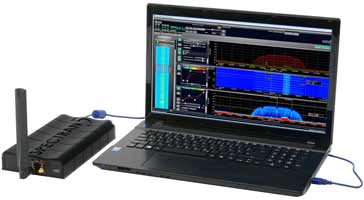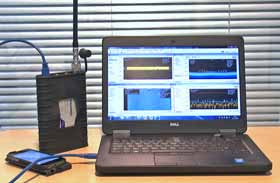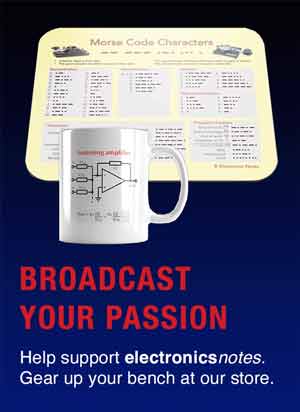USB Spectrum Analyzers: are they worth considering?
Using the processing power of a PC via a USB connection enables spectrum analyzers to be made more cost effective and smaller.
Spectrum Analyzer Tutorial Includes:
What is a spectrum analyzer
Spectrum analyzer types and technologies
Superheterodyne / sweep spectrum analyzer
FFT spectrum analyzer
Realtime spectrum analyzer
USB spectrum analyzer
Spectrum analyzer tracking generator
Specifications
Spectrum analyzer operation
Noise figure measurements
Phase noise measurements
Pulsed signal spectrum analysis
USB spectrum analyzers are a very convenienent way of providing excellent performance to fit a cost limited budget.
In addition to this, USB spectrum analyzers are normally very compact as they use the power supply, display and processing from the computer to which they are connected.
Today there are also many small low costspectrum analyzers that can be bought and these can be run in stand-alone mode or also linked via a USB link to a computer.
However there are also a number of professional quality USB analyzer where the performance is is a different league to the small hobbyist ones.

In view of their advantages, there is a very wide variety of USB spectrum analyzers on the market.
USB spectrum analyzers vary considerably in performance. At the low end they are relatively simple, offering very low cost and basic performance. At the high end, many can compete with much larger and more expensive test instruments. Some USB spectrum analyzers even offer realtime functionality.
USB spectrum analyzer basics
USB spectrum analyzers vary considerably in their make-up as some are far more capable than others.
The very basic ones will have the minimum of hardware within the analyzer module, and will carry out all the processing in the associated computer, whereas the higher end modules will have the RF circuitry as well as an FPGA to undertake the signal processing.
It is only the analyzers with FPGAs within the USM module that are able to provide realtime analysis as a computer is likely to run a Windows operating system that is not able to provide realtime operation.
USB spectrum analyzer advantages & disadvantages
The USB spectrum analyzer approach offers many advantages. As a result a wide variety of USB based spectrum analyzers have appeared on the market.
The USB spectrum analyzer has a number of key advantages, but there are also some key points to note – these are disadvantages on some of these analyzers but possibly not all. It is worth studying the specification sheets to see whether a particular USB spectrum analyzer will meet your particular needs.
USB spectrum analyzer advantages
- Size: USB spectrum analyzers are generally very small. This is because they are designed for use with an accompanying PC. This will provide the power, a proportion of the processing, control interface and display. As a result the USB analyzer contains much less than that of an analyzer using a different approach. As many applications require the use of an accompanying computer anyway, the use of the computer for the spectrum analyzer as well makes much sense.
- Cost: Much of the cost of any test instrument is associated with the power supply, user interface and display. Removing these from the test instrument means that costs can be considerably reduced. Many USB spectrum analyzers, but by no means all of them, target the low end of the market and therefore costs of the RF sections of the analyzer are much less than those of a full specification high end spectrum analyzer.

USB spectrum analyzer points to investigate
As there is such a wide variety of USB spectrum analyzers, not all will be the same. However when making a choice about a particular test instrument, or whether to use a USB spectrum analyzer, these are some of the points to note.
- Overall cost: When buying a USB spectrum analyzer it is necessary to take into account the cost of the PC associated with the analyzer. Whilst the PC may often already be available and intended for use with the overall test system, in many instances the USB spectrum analyzer will require the purchase the purchase of the PC or laptop. This cost needs to be taken into consideration.
- Performance: It is most unlikely that the performance of a USB spectrum analyzer will meet the performance of a boxed instrument. Parameters like bandwidth, dynamic range, amplitude accuracy, phase noise and many other parameters are likely to be inferior. This is only to be expected in view of the cost and size. However the performance may be perfectly adequate for many applications and in these instances the use of a USB option makes good sense. It is necessary to take a really good look at the specification sheet for the analyzer and compare it with what is really required.
It is worth checking all the specifications and parameters for the performance of the USB spectrum analyzer. Check it against that of other analyzers to act as a prompt for what your requirement may need.
 Written by Ian Poole .
Written by Ian Poole .
Experienced electronics engineer and author.
More Test Topics:
Data network analyzer
Digital Multimeter
Frequency counter
Oscilloscope
Signal generators
Spectrum analyzer
LCR meter
Dip meter, GDO
Logic analyzer
RF power meter
RF signal generator
Logic probe
PAT testing & testers
Time domain reflectometer
Vector network analyzer
PXI
GPIB
Boundary scan / JTAG
Data acquisition
Return to Test menu . . .



